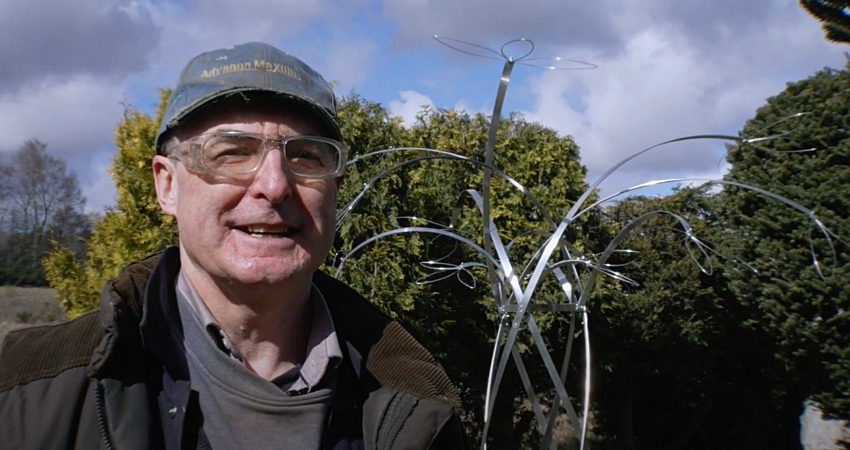


RUE FIVE
Meet our Scene Stirling Digital Commission cohort, Rue Five.
Rue Five is a multi-disciplinary artist originally from Stirling, currently living in Glasgow. As a member of the Scottish art collective Team Recoat and founder of Folk-Life, he has exhibited extensively throughout Europe and the Americas.. He has been commissioned to design a virtual exhibition tour, supplemented by public artworks (murals, signs and sculptures). The project will include an interactive GPS-triggered walk around his home city. ⠀
⠀
Rue Five said: "I'm happy to be a part of the Scene Stirling Digital Commissions and look forward to working with them in furthering my own creative journey within the arts, as well as fostering other local talent."⠀
⠀
Rue Five was mentored by Mike Inglis, a lecturer at the Edinburgh College of Art and a multidisciplinary artist.⠀
MEET RUE FIVE
Who are you? What do you do?
I’m Rue Five, I'm an unschooled multidisciplinary artist from Stirling currently living in Glasgow. I’ve been a working artist since I was a teenager. I was raised by a dog and a gang of bikers on a staple diet of Saturday morning cartoons and a VHS cupboard filled with weird and esoteric sci-fi fantasy films.⠀
⠀
I learned to read with British comics like The Beano, 2000AD, and other more adult-oriented comic-strips like Ogri (the sort you tend to find in Biker mags). I spent the rest of my childhood collecting and drawing comics, being especially influenced by the few European artists whose work managed to filter through Marvel to my local newsagent. I started photocopying and selling my own when I was ten, I charged 25p and sold them all, a teacher confiscated them and I was banned from bringing more to school. I stopped going to school. ⠀
⠀
By 16 working as an assistant sign-writer and was deeply entrenched in the DIY worlds of Skateboarding and Graffiti, all of which acted as a crash course in the history of outsider arts, crafts, and music. I was also technically homeless and would remain so on and off for the next seven years.⠀
⠀
Out of the blue, I decided to attend an art opening in Edinburgh with a pocketful of drawings and before the end of the night (thanks to the great and gregarious Bryan Clarke AKA Krisis) I was in the exhibition. I connected with a great crew of artists that night who encouraged and supported me and continue to be a great influence and inspiration. I've since traveled and exhibited my work worldwide often with people I met that night.⠀
What's your Scene Stirling project? Tell us about it.
My project for Scene Stirling was intended to be a virtual tour of a physical exhibition supplemented by small scale public artworks and an interactive GPS-triggered sound walk. I’m interested in the hauntological aspects of liminal places and hope to interact with the real or imagined histories of these spaces both personal and public.⠀
⠀
My hope was to bridge the gap between the digital and real, however current conditions have forced me to pivot towards an exclusively digital presentation (albeit one I am treating as a jumping off point for possible future work in and around Stirling). Inspired by a style of role-playing game known as a Dungeon Crawler in which characters navigate an interior often virtual environment and titled in Gaelic as Èalaidh-Seòmar (pron. ee-ah-lie shaw-merr). ⠀
⠀
Though èalaidh-seòmar is not a direct English to Gaelic translation of dungeon crawler (that would likely be èalaidheach toll-dubh or perhaps snàgan toll-dubh) I have decided to title it this because of the similar length and cadence and because the word ÈALAIDH (which in this instance refers to slow movement) when used without the grave accent refers to art, music and the act of learning, specifically new skills.⠀
⠀
This past week I have reacquired the domain ‘http://ruefive.uk’ and almost completed building out the project’s website. I normally find it difficult creating work without knowing how or where it will be presented and was surprised that something as simple as knowing the layout of a web page has helped in much the same way as working within a physical space would. I've also enjoyed working on the audio side as this has enabled me to collaborate with friends in Stirling in a way I haven't been able to since before the spread of Covid-19.⠀
Where do you currently work from?
Like so many during this trying time I have been confined to my tiny house, a house-made even smaller by the fact that my partner is currently studying fashion technology and has been forced to turn our living room, kitchen and hall into what I can only describe as a makeshift sweatshop.⠀
⠀
My own studio space is in Stirling, something that has never been an issue before but sadly is now out of reach and has been unfortunately unused for over a year. As a result, my current work process is very much confined to my sketchbook much like I am confined to the bedroom.⠀
What challenges are you facing?⠀
The challenges thrown up by Covid-19 (and Brexit) on my project have been many and varied, everything from lack of space and materials to the inability to travel or source said materials within any definite timeframe and honestly a near-total creative block, I’ve found it extremely difficult to even think about making work.⠀
⠀
And as both myself and my partner are finishing projects and preparing for digital shows at the same time the likelihood of us having to work in shifts in order to have anything resembling a functional workspace has become increasingly apparent. ⠀
⠀
I was already struggling with the idea of my work existing detached from a physical space, centered within a digital context and I had hoped to mitigate this with concurrent real-world installations, however, you work with what you have, and right now what I have is a sketchbook, an old scanner and a terrible internet connection.⠀
What have you learnt in your commission so far?⠀
So far being forced to shrink my work down and consider how to digitally present that in a way that conveys what I want from it without getting hung up on what is lost in the digital reproduction of the artwork has been my main issue at least in concept, practically however it’s thrown up new possibilities for incorporating digital into my workflow that is quite exciting. The digital workshops with Scene Stirling have been a great help in this, as has the advice of my mentor Mike Inglis (@mikeinglis.studio).⠀
⠀
As a result of working towards a fully digital presentation of the work I have found myself thinking of it within a more graphical framework, this combined with my lack of workspace has led to a looser style favouring digital process over large scale works or any wet media. I look forward to seeing the end result. ⠀
Mentored by Mike Inglis
Mike Inglis is a practicing artist and part time lecturer at Edinburgh College of Art. Mike Inglis practice explores the creative possibilities that exist between public art and outsider art. He enjoys making publically sited work that explores transitional spaces that “outsider art” often inhabits as well as bleeding these practices into work for more traditional gallery spaces.
He is particularly interested in found materials and adhocist approaches to construction. The focus of his research engages in a direct dialogue with outsiders or isolated communities, their dogmas or doctrines becoming the core of shared dialogues. He is interested in exploring ideas that surround superstitions and belief systems in a wide variety of outputs from installations and films to drawing and printmaking.
“Jules was a great collaborator in our conversations and keen to discuss all aspects of the process, which was complicated hugely by the pandemic. As someone who perhaps has slightly less experience in this area of publicly-funded projects, Jules has been keen to discuss all aspects of the process. I hope he has taken some reassurance from our conversations.
I myself felt that the amount of training that was offered was very impressive and all aspects of the support an artist needs on this kind of project were considered fully and catered for. I enjoyed working with Jules and would happily be involved in future projects should our future schedules allow.”









